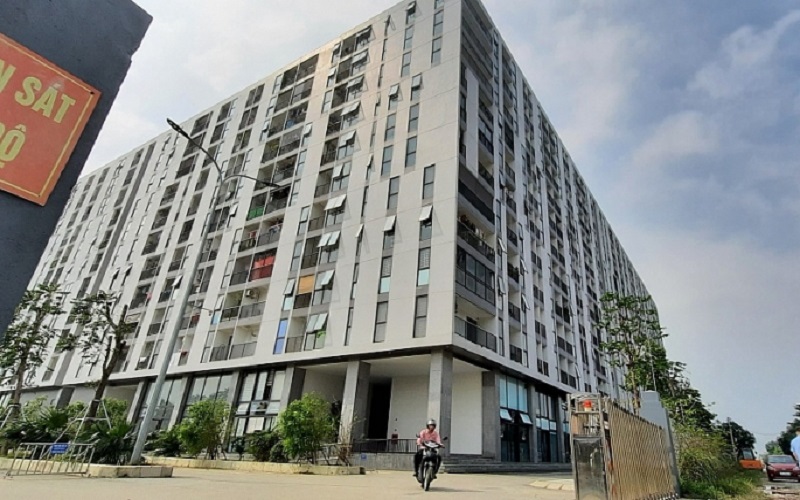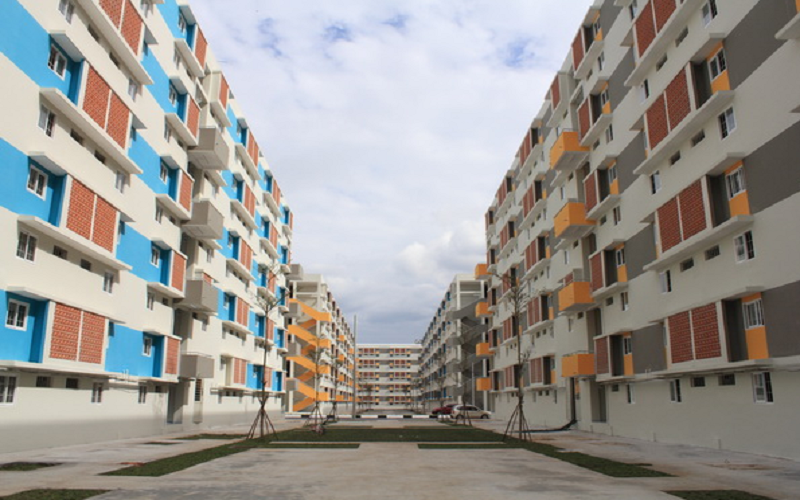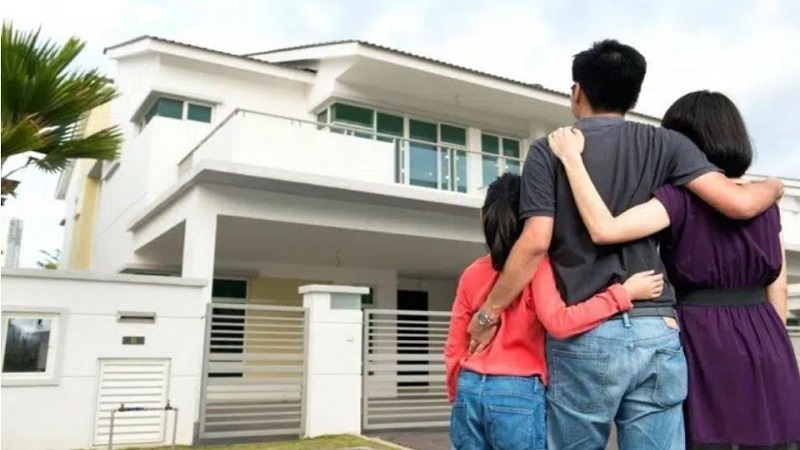Buying social housing (NƠXH) is an option for people to own a house at the lowest possible price. To be eligible for a social housing purchase, you must meet certain conditions and provide the necessary documentation.
1 Requirements for Rent-to-Own or Purchase of Social Housing
Just as bank loans have a myriad of conditions, so too does the purchase of social housing. Article 51 of the Social Housing Law clearly outlines three conditions that must be met:
First, there are those facing housing difficulties, including the following groups
- Individuals or families who do not own a house and are forced to rent, borrow, or live with others.
- Those whose houses have been reclaimed by the state for clearance or who have not received compensation in the form of alternative housing or land, due to decrepit apartments or other reasons as decided by the state.
 People facing housing difficulties are eligible for social housing
People facing housing difficulties are eligible for social housing
- Those who have not been allocated land for residential purposes according to land laws.
- Those who have not purchased, rented, or rent-to-owned state-owned or social housing properties in other projects.
- Those who have not received charitable housing donations.
- Those who own a house but live in cramped conditions, with an average household floor space of less than 10m2/person. This includes separate houses with an average floor space of less than 10m2/person and a land area below the minimum standard area permitted for renovation and construction, as determined by the provincial People’s Committee where the house is located.
Second, residency requirements
The applicant must have permanent residence in the province or centrally-run city where the social housing is located.
In cases where the applicant does not have permanent residence, they must have temporary residence registration and a labor contract of at least one year, along with proof of social insurance contributions in the province or centrally-run city where the social housing is located. For households or individuals subject to resettlement, residency requirements as stipulated by the provincial People’s Committee must be met.
 Permanent residence is required in the province or city where the social housing is located
Permanent residence is required in the province or city where the social housing is located
Third, low-income requirements
According to regulations, low-income individuals are those who are not subject to personal income tax under personal income tax laws. This includes those classified as poor or near-poor according to the Prime Minister’s regulations.
2 What are the Procedures and Required Documents for Purchasing Social Housing?
Documents Required for Social Housing Purchase
 Buyers must prepare documents proving they meet the eligibility criteria
Buyers must prepare documents proving they meet the eligibility criteria
According to Article 22 of Decree 100/2015/NĐ-CP, as amended and supplemented by Clause 16, Article 1 of Decree 49/2021/NĐ-CP, and Article 10 of Circular 20/2016/TT-BXD, eligible individuals who have not yet benefited from social housing policies must prepare a dossier with the following documents:
- Application form for purchasing, renting, or rent-to-own housing (Form 01).
- Documents proving eligibility to purchase social housing.
- Documents proving residency.
- Documents proving income.
Eligible Buyers of Social Housing
According to the 2014 Housing Law, there are ten groups of individuals who are eligible for social housing support. Priority is given to the following groups:
- People with revolutionary merits
- Poor and near-poor households in rural areas
- Households in rural areas regularly affected by natural disasters and climate change
- Low-income individuals and poor or near-poor households in urban areas
In addition to the above-mentioned groups, the following individuals are also given priority for social housing:
- Officers, non-commissioned officers, professional soldiers, career soldiers, and workers in agencies and units of the People’s Public Security and the People’s Army
- Officials, public employees, and civil servants
- Households and individuals subject to land recovery and house clearance as stipulated by law, who have not been compensated with alternative housing or land…
Procedures for Purchasing Social Housing
Step 1: Submit the Application
According to Clause 1, Article 20 of Decree 100/2015/NĐ-CP, the buyer submits the application and required documents to the project investor.
Step 2: Application Receipt and Verification
The official receiving the application checks if the application is valid and complete. If not, the application is returned to the buyer with a reason for the rejection, and the buyer is given the opportunity to supplement and complete the application.
If the application is valid, the project investor will forward the application to the local Department of Construction for further verification and approval. This step ensures that the buyer has not previously benefited from state support in terms of housing or land and has not purchased, rented, or rent-to-owned in other projects.
 The local Department of Construction verifies the buyer’s information after receiving the application
The local Department of Construction verifies the buyer’s information after receiving the application
Step 3: Application Processing Time and Result Communication
If the Department of Construction has no objections, the project investor will notify the buyer to agree and sign a contract within 15 days from the date of application submission.
Step 4: Application Processing
After the buyer signs the contract, the project investor will submit a list of buyers to the local Department of Construction for public announcement within 30 working days for management, inspection, and post-inspection purposes. The investor will also publish this list on their information portals and at their headquarters.
3 Frequently Asked Questions about Social Housing Purchase
1. How long is the ownership period for social housing?
Social housing follows the same standards as commercial housing, as specified in Article 55 of the 2014 Housing Law. The duration of use of the house is based on two factors:
– The grade of the construction work
– The results of the quality inspection by the housing management agency
The calculation of the duration based on the grade of the construction work is according to the Construction Quality Management Regulations, issued together with Circular No. 13/2013/TT-BXD:
- Grade 4 constructions have a lifespan of less than 20 years.
- Grade 3 constructions have a lifespan of 20 to less than 50 years.
- Grade 2 constructions have a lifespan of 50 to 100 years.
- Grade 1 constructions have a lifespan of over 100 years.
2. Can social housing be mortgaged?
According to Clause 4 and Clause 5, Article 19 of Decree 100/2015/NĐ-CP on the development and management of social housing, buyers of social housing are not allowed to mortgage their property (except when mortgaging with a bank to borrow money to buy or rent-to-own the same property) and are not allowed to transfer ownership in any form within a minimum of 05 years from the date of full payment for the purchase or rent-to-own according to the signed contract. They can only sell, mortgage, or rent the property after obtaining the Certificate of Land Use Right, Ownership of Housing and Other Assets Attached to Land according to land law regulations.
 Rent-to-own social housing cannot be mortgaged or transferred within the first 5 years
Rent-to-own social housing cannot be mortgaged or transferred within the first 5 years
From the time the buyer is allowed to sell the social housing to eligible individuals, in addition to the payments required by law when selling the house, the seller must pay the state 50% of the land use value allocated to that apartment. In the case of selling low-rise social housing, 100% of the land use value must be paid, calculated according to the land price issued by the provincial People’s Committee at the time of sale.
3. Does social housing come with a “red book” (land use right certificate and house ownership certificate)?
According to state regulations, the sale and purchase contract for social housing will be exchanged for a “red book” after 5 years of use. However, according to the latest state regulations, the investor must facilitate the issuance of the “red book” once the buyer has paid 100% of the apartment value. This regulation took effect in June 2016, meaning buyers can now obtain the “red book” for their social housing after full payment.
4. Can social housing be sold, rented, or transferred?
The principles of renting, rent-to-own, and selling social housing are stipulated in Article 62 of the 2014 Housing Law:
The rental, rent-to-own, and sale of social housing must comply with the provisions of this Law. Within the same period, each eligible individual as specified in Clause 1, Article 50 of this Law is only allowed to rent or rent-to-own or buy one social housing property. For students at ethnic minority boarding schools, no rent or service fees are charged during their stay.
The minimum term of a social housing rental contract is 05 years; the minimum term for paying rent-to-own social housing is 05 years, counted from the date of signing the rent-to-own contract.
The tenant or rent-to-own tenant is not allowed to sell, rent, or lend the house during the rental period; if the tenant or rent-to-own tenant no longer needs the house, the contract is terminated, and the house must be returned.
 The minimum term of a social housing rental contract is 5 years
The minimum term of a social housing rental contract is 5 years
The rent-to-own tenant or buyer is not allowed to sell the house within a minimum of 5 years from the date of full payment for the rent-to-own or purchase according to the contract. If, within 5 years from the date of full payment, the rent-to-own tenant or buyer wishes to sell the house, it can only be sold back to the social housing management unit or to an eligible buyer as specified by law, at a maximum price equal to the selling price of the same type of social housing in the same location and at the same time, and without having to pay personal income tax.
After 5 years from the date of full payment for the rent-to-own or purchase, and upon obtaining the “red book,” the rent-to-own tenant or buyer can sell the house according to market mechanisms to eligible individuals, but must pay land use fees as stipulated by the Government and pay taxes according to tax laws. If sold to an eligible buyer as specified by law, the maximum selling price is equal to the selling price of the same type of social housing in the same location and at the same time, and no personal income tax is payable.
Thus, social housing can be sold, rented, or transferred after 5 years of ownership and upon obtaining the “red book.”
5. How to borrow money to buy social housing?
The Government has recently issued Decree No. 49/2021/NĐ-CP amending and supplementing a number of articles of Decree No. 100/2015/NĐ-CP on the development and management of social housing (NƠXH).
According to Decree 49, individuals can borrow capital to buy, rent-to-own, build new, or renovate and repair social housing. For the purchase or rent-to-own of social housing, the maximum loan amount is 80% of the value of the purchase or rent-to-own contract. For the construction of new houses or the renovation and repair of existing houses, the maximum loan amount is 70% of the estimated cost or loan proposal but does not exceed VND 500 million and 70% of the value of the secured asset.
 Loans for the purchase or rent-to-own of social housing can cover up to 80% of the contract value
Loans for the purchase or rent-to-own of social housing can cover up to 80% of the contract value
The Prime Minister decides on the interest rate for each period based on the proposal of the Board of Directors of the Social Policy Bank. The interest rate for loans from designated credit institutions is determined and announced by the State Bank of Vietnam, ensuring that it does not exceed 50% of the average lending

































